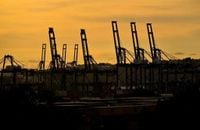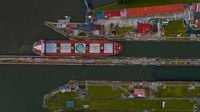Chinese leaders are expressing strong discontent over Li Ka-shing's plans to divest from global assets, particularly as his company, CK Hutchison, faces scrutiny from Beijing. This discontent became evident through a series of aggressive editorials in Chinese media targeting the $21 billion conglomerate. On March 31, 2025, shares of CK Hutchison dropped by 5% following a Reuters report that the company would delay the sale of its port operations in Panama, part of a proposed $23 billion deal with a BlackRock-led consortium.
According to Reuters, the delay stems from a review by the China Securities Regulatory Commission, which announced it would investigate potential anti-competitive practices related to the sale. Since the announcement of the deal, CK Hutchison has lost half of its stock market gains, having previously surged by 33% after the deal was first disclosed.
Li's family has significantly reduced CK Hutchison's investments in China since a restructuring in 2015, which included a move to register the company in the Cayman Islands. Despite this, CK Hutchison retains approximately $14 billion in assets in China, representing about 9% of its total assets as of last December. Meanwhile, its sister company, CK Asset, which is valued at $14 billion, derives up to 43% of its profits from Hong Kong and China. These remaining interests in retail, utilities, and real estate sectors are seen as major leverage points for Beijing.
Beijing has already pledged to review the sale of the ports, which could disrupt the transaction. The IPO for FWDD, an Asian insurance company valued at around $9 billion and controlled by Li's youngest son, also requires Beijing's approval. The Hong Kong government may also scrutinize competition issues in the electricity and real estate sectors that affect CK Hutchison.
If Beijing escalates pressure on the Li family, it risks undermining its message of being open to business. However, China has shown a willingness to endure reputational setbacks to maintain control over its business leaders, as evidenced by its crackdown on Alibaba founder Jack Ma and broader efforts to regulate the Chinese tech sector.
In a related development, CK Hutchison recently sold 43 ports in 23 countries to a BlackRock-led consortium for $19 billion. This sale, which includes operations in the vital Panama Canal, highlights the growing geopolitical tensions between Beijing and Washington, particularly as analysts note the significance of container centers in this rivalry.
After weeks of negotiations, Beijing intensified its rhetoric, insisting that the state’s market regulator would assess the project, likely preventing the signing of the agreement as scheduled on April 2. Experts had previously noted that the deal would allow U.S. President Donald Trump to announce the "restoration" of the canal as part of his "America First" agenda.
Kurt Tong, managing director at Asia Group and a former U.S. diplomat in Hong Kong, remarked, "The United States created a political issue at the expense of China, and from there it was able to announce victory." This sentiment reflects the unease in Beijing regarding the transaction.
Some of the ports being sold are located in countries participating in China’s Belt and Road Initiative (BRI), a massive infrastructure project launched by President Xi Jinping. Henry Gao, a trade law expert at the National University of Singapore, emphasized the importance of these ports for the BRI, asserting that China has achieved significant success in this area.
However, Panama recently withdrew from the BRI following a visit from U.S. Secretary of State Marco Rubio, further complicating the geopolitical landscape. Gao noted an increasing trend of using ports and infrastructure for geopolitical leverage.
On March 4, CK Hutchison shocked the Chinese shipping sector by announcing an unprecedented deal, according to Xie Wenkang, a port development researcher at the Shanghai International Shipping Institute. Chinese shipping companies are now questioning whether they can ensure neutral passage after the ownership transfer of the ports. Concerns have been raised about additional costs for Chinese vessels and potential discriminatory treatment regarding waiting requests, especially given the U.S. authorities' capacity to enforce regulations broadly.
Wang Yiwei, director of the Institute of International Affairs at Renmin University, warned that the agreement, along with recent increases in U.S. tariffs, could undermine China’s manufacturing dominance. He stated, "Increased inspections and additional docking costs could erode China's competitiveness and disrupt global supply chains." Wang further noted that the U.S. has utilized various justifications to target key infrastructure projects under the BRI, aiming to diminish these assets and weaken China's position as the world’s factory.
John Bradford, executive director of the Yokosuka Council on Asia-Pacific Studies, stated that while the agreement does not serve China’s interests, some concerns are exaggerated. He clarified that port operators like CK Hutchison are commercial entities bound by law and cannot make decisions on national sovereignty, such as whether a ship can dock at a port. "If operators clearly favor one company over another, it would generally be illegal," he added, noting that most countries have laws requiring fair treatment of various clients.
The steps Beijing takes to scrutinize CK Hutchison could have far-reaching implications for Hong Kong and its role as a gateway for Chinese businesses to the world. Tong emphasized that the Panama ports issue has reignited discussions about whether Hong Kong remains a suitable location for asset investment or business operations, stating, "Foreign companies operating in Hong Kong are certainly watching this issue closely."
CK Hutchison is registered in the Cayman Islands, and all assets for sale are located outside China. However, this has not stopped the state’s market regulator from announcing an anti-trust review. Geet Ding, a leading partner at Dentons in Beijing, indicated that Chinese anti-trust laws could apply extraterritorially, similar to U.S. and EU laws. Companies involved in the agreement may need to file reports even if the deal occurs abroad, provided that the parties have substantial operations in mainland China. Ding warned that firms failing to report could face fines of up to 10% of their previous year’s operating income.
Hong Hou Fung, a political science professor at Johns Hopkins University, remarked that Beijing risks alarming cautious foreign companies that have already scaled back their business activities in Hong Kong. He cautioned that if the agreement collapses under Chinese pressure, it could lead people to believe that Hong Kong is aligning more closely with mainland China, where national security considerations dominate any commercial transaction.





